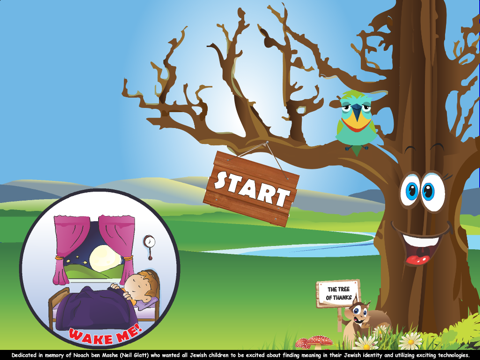
iThankYou - Modeh Ani app for iPhone and iPad
Developer: Jewish Interactive
First release : 13 Jun 2013
App size: 40.16 Mb
This easy-to-use, colourful app teaches children the prayer Modeh Ani and encourages children to be thankful for what they have, building the quality of gratitude. Every day, as the child says Modeh Ani, they fill in a leaf on their ‘Tree of Thanks’ recording what they are grateful for. They can take a photo, record their voice or draw what they are grateful for, and hang the leaf in the tree. Each leaf that is filled in gets the tree watered. If a leaf has not been filled in for a day, the tree wilts and recovers only when another leaf of gratitude has been filled in. The tree gets filled with leaves that can be saved and viewed at any time. Earn golden leaves for items that you are super-grateful for when you proceed in the quiz that teaches you more about the prayer Modeh Ani.
For parents:
Do your children take what they have for granted? Every morning, Jews wake up and say the prayer Modeh Ani, where we say thank you to God that we have woken up and had our soul has been returned to us. We are grateful! This app not only teaches Jewish children the prayer Modeh Ani in a fun and interactive way, but helps parents encourage children to be grateful for the many good things that they have, learning about gratitude every day.
Rich Jewish content:
Tree of Thanks includes Jewish sources and information regarding Modeh Ani, gratitude, Tu Bi’Shvat - the new year for the trees, Shivat Haminim - the seven species, and we also find out what our sages say about how we should wake up in the morning.
Features:
•Interactive Tree of Thanks to record leaves of gratitude
•Karaoke tool of Modeh Ani with an original tune
•Interactive quiz: Through directed feedback, children learn when, how and why we say Modeh Ani , learn what our sages say about waking up in the morning, and also connect the Tree of Thanks with Tu Bi’Shvat, the new year for trees, and the Tu Bi’Shvat tradition of eating Shivat Haminim, the seven species.
•Poster-making tool enables children to make their own poster of the prayer to pin up next to their beds so that they can remember to say it as they wake up.
•Available in English (both Nusach Sephardi and Ashkenazi) and Hebrew



